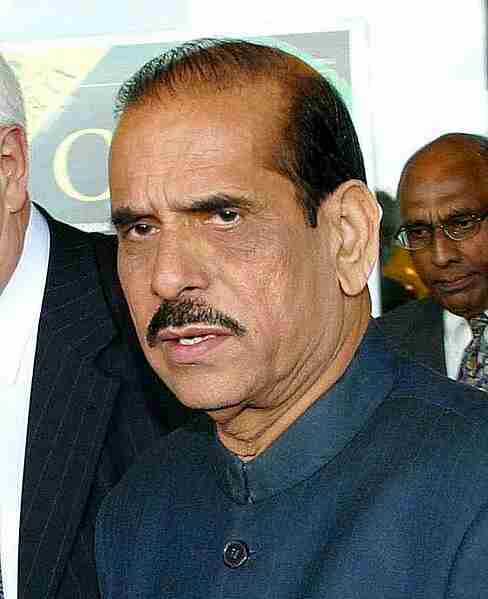Manohar Joshi Passes Away : Former Chief Minister of Maharashtra and ex-Lok Sabha Speaker, Manohar Joshi, breathed his last at the age of 86 today, succumbing to a cardiac arrest. Mr. Joshi had been admitted to the ICU at P.D. Hinduja Hospital on February 21, where he was under observation and receiving medical care for the cardiac event.
Manohar Joshi Passes Away at 86: Former Maharashtra Chief Minister

Health Struggles and Previous Hospitalization:
This is not the first time Mr. Joshi faced health challenges. Last year, in May, he was admitted to the same Hinduja Hospital after suffering a brain hemorrhage. The recent cardiac trouble added to his prolonged age-related health issues, leading to his demise.
Political Journey:
Manohar Joshi played a significant role in Maharashtra’s political landscape. He served as the Chief Minister of Maharashtra from 1995 to 1999, leaving an indelible mark on the state’s development. Following his stint as Chief Minister, he served as the Speaker of the Lok Sabha from 2002 to 2004. His political journey also included being a Member of Rajya Sabha from 2006 to 2012 and serving as the Minister of Heavy Industries and Public Enterprises from 1999 to 2002.
Political Leaders Pay Tributes:
Deputy Chief Minister Devendra Fadnavis acknowledged Joshi’s immense contributions, highlighting his rise from being a corporator and mayor of Mumbai to Chief Minister and Member of Parliament. Fadnavis praised Joshi’s discipline in both personal and public life.
Deputy CM Ajit Pawar expressed deep sorrow at the loss, emphasizing Joshi’s role as a leader fighting for the rights of Marathi people. He described Joshi’s death as a significant loss to Maharashtra’s political, social, and education sectors.
NCP Founder Sharad Pawar’s Reflections:
Former Union minister and NCP founder Sharad Pawar remembered Joshi as a straightforward leader with an outspoken and bold work attitude. Pawar recalled Joshi’s trusted partnership with Shiv Sena chief Balasaheb Thackeray and praised his inclusive leadership during his tenure as Chief Minister. Pawar also acknowledged Joshi’s instrumental role in setting up an equestrian statue of Chhatrapati Shivaji in the Parliament premises during his time as the Speaker of the Lok Sabha.
Funeral Details:
The family has announced that the funeral will be held at Dadar Shivaji Park Crematorium, with full state honors. According to Manohar Joshi’s son Unmesh, the mortal remains will be brought to their house in Matunga before the final rites.
Legacy and Condolences:
Manohar Joshi’s passing marks the end of an era in Maharashtra’s political landscape. His contributions to the state’s development, dedication to public service, and leadership qualities are remembered by political leaders and citizens alike. Condolences pour in for the Joshi family as Maharashtra mourns the loss of a revered political figure.
The hospital, in an earlier statement, had conveyed the severity of Joshi’s condition, mentioning that he was in the ICU receiving the best medical care. The news of his demise is met with sadness across political circles and the general public, reflecting on the end of a political era in Maharashtra.
Early Life:
Manohar Joshi, a prominent Indian politician, was born on December 2, 1937, in Pune, Maharashtra, India. Here’s an overview of his early life and political career.
Manohar Joshi was born into a middle-class Brahmin family. He completed his early education in Pune and later pursued a degree in civil engineering. Joshi’s early life was marked by a keen interest in social and political issues, foreshadowing his later involvement in politics.
Entry into Politics:
Manohar Joshi began his political journey through grassroots activism. He entered the political scene as a member of the Rashtriya Swayamsevak Sangh (RSS), a right-wing Hindu nationalist organization. His association with the RSS played a crucial role in shaping his political ideology.
In the 1960s, Joshi ventured into municipal politics in Mumbai. He served as a corporator in the Brihanmumbai Municipal Corporation (BMC) and later became the Mayor of Mumbai. His tenure as Mayor marked the beginning of his rise in Maharashtra’s political landscape.
Shiv Sena Association:
Manohar Joshi was a key member of the Shiv Sena, a regional political party in Maharashtra founded by Balasaheb Thackeray in 1966. His association with Shiv Sena became a defining factor in his political career. The party, known for its pro-Marathi and Hindutva stance, provided Joshi with a platform to express his political ideologies.
Chief Minister of Maharashtra:
In 1995, Manohar Joshi achieved a significant milestone in his political career by becoming the Chief Minister of Maharashtra. His tenure, which lasted until 1999, was marked by various developmental initiatives in the state. He focused on infrastructure projects and urban development during his leadership.
Speaker of the Lok Sabha:
After serving as Chief Minister, Joshi moved to national politics. He became the Speaker of the Lok Sabha from 2002 to 2004. As the Speaker, he played a crucial role in maintaining parliamentary decorum and facilitating smooth proceedings.
Later Political Roles:
Following his tenure as the Speaker, Joshi continued to be actively involved in politics. He served as a Member of Rajya Sabha from 2006 to 2012. Additionally, he held the position of Minister of Heavy Industries and Public Enterprises in the central government from 1999 to 2002.
Manohar Joshi’s political career was characterized by his dedication to the development of Maharashtra and his commitment to the principles of the organizations he associated with, particularly the Shiv Sena and the RSS. His contributions and leadership left a lasting impact on the political landscape of Maharashtra.
FAQs: The Life and Legacy of (Manohar Joshi Passes Away)
- Q: When did Manohar Joshi pass away, and what was the cause of his death?
A: Manohar Joshi passed away on February 23, 2024. The cause of his death was a cardiac arrest. He had been admitted to P.D. Hinduja Hospital in Mumbai and was in the ICU.
- Q: Can you provide more details about Manohar Joshi’s political career?
A: Manohar Joshi served as the Chief Minister of Maharashtra from 1995 to 1999 and as the Speaker of the Lok Sabha from 2002 to 2004. He was also a Member of Rajya Sabha from 2006 to 2012 and held the position of Minister of Heavy Industries and Public Enterprises from 1999 to 2002.
- Q: What were some of Manohar Joshi’s health struggles before his passing?
A: Last year in May, Manohar Joshi was admitted to P.D. Hinduja Hospital after suffering a brain hemorrhage. Prior to his passing, he was admitted again due to cardiac trouble, adding to his prolonged age-related health issues.
- Q: What tributes have been paid to Manohar Joshi by political leaders?
A: Deputy Chief Minister Devendra Fadnavis acknowledged Joshi’s immense contributions and disciplined approach. Deputy CM Ajit Pawar highlighted Joshi’s role in fighting for the rights of Marathi people. NCP founder Sharad Pawar praised Joshi’s straightforwardness and bold work attitude.
- Q: Where will Manohar Joshi’s funeral(Manohar Joshi Passes Away) take place, and what are the details?
A: The funeral of Manohar Joshi will be held at Dadar Shivaji Park Crematorium with full state honors. Before the last rites, his mortal remains will be brought to the family house in Matunga.
- Q: Can you elaborate on Manohar Joshi’s early life and entry into politics?
A: Manohar Joshi was born on December 2, 1937, in Pune. He had a background in civil engineering and entered politics through grassroots activism. His association with the Rashtriya Swayamsevak Sangh (RSS) and later the Shiv Sena played a crucial role in shaping his political career.
- Q: What were some of the key roles played by Manohar Joshi during his Chief Ministership in Maharashtra?
A: During his tenure as Chief Minister from 1995 to 1999, Manohar Joshi focused on infrastructure projects and urban development in Maharashtra. His leadership left an indelible mark on the state’s development.
- Q: How did Manohar Joshi contribute to the national political scene after his Chief Ministership?
A: After serving as Chief Minister, Joshi became the Speaker of the Lok Sabha from 2002 to 2004. He continued his political career by serving as a Member of Rajya Sabha from 2006 to 2012 and as the Minister of Heavy Industries and Public Enterprises from 1999 to 2002.















